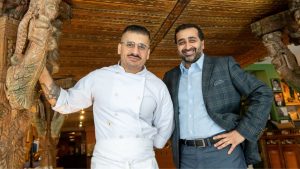Down in Minneapolis, Minn., Ottawa entrepreneur Frazer Nagy is working on a way to revolutionize the restaurant and agri-food industries.
He’s in good company: food and agricultural giants including the likes of Cargill, General Mills and Ecolab all make their homes in or a stone’s throw away from the Twin Cities. Not to mention, it’s home to Techstars’ Farm to Fork accelerator, a collection of high-potential agri-tech companies eager to take a bite out of the emerging field.
Nagy’s startup, Transparent Kitchen, joined the latest cohort just a couple weeks ago. The Ottawa firm is looking to disrupt the way we choose where we eat in the same way streaming services such as Spotify changed the way we listen to music.
OBJ360 (Sponsored)

Mini home? Tiny house? Here’s what you need to know before investing
Building a backyard coach house is easier thanks to Bill 23, and Ottawa General Contractors are helping home owners make it happen.

Vegan? Halal? Gluten-free? This Ottawa restaurant has you covered
For food lovers who have dietary restrictions, it can often be a challenge to find a restaurant that checks all the boxes.
“Transparent Kitchen is on the path to becoming a household name,” he tells OBJ.
If it succeeds, Transparent Kitchen could have a seismic impact on North American eating habits. If it lands even a hair shy of mainstream notoriety, however, the company’s mission may very well fail.
Farming roots
Nagy, Transparent Kitchen’s CEO, comes from a long line of farmers that migrated from Hungary to Ontario some 200 years ago. He got his own start in food helping out in restaurants as a young teenager, and credits local institutions such as Restaurant 18 and Sidedoor for showing him the ropes.
“That’s when I really discovered what the farm-to-table movement meant from the restaurant standpoint, and what a great kitchen truly is.”
Farm-to-table is a social movement that encourages consumers to shop and eat food that’s grown locally. In restaurants, that means sourcing ingredients from local farmers and avoiding pre-packaged or bulk orders.
While he was inspired by the local food movement, and noticed the trend gaining steam among diners, Nagy said he saw a disconnect in his early exposure to the restaurant industry. While chefs in scratch kitchens were walking the walk when it came to farm-to-table, they needed a marketing push – someone to talk the talk.
“People want to know the story of who the chef is. Where did the vegetables, where did the meat come from? Was it raised properly? What is the impact of that restaurant?
“Every business is built on a story … The story for diners remains a mystery.”
Frazer Nagy, CEO of Transparent Kitchen
“Every business is built on a story,” Nagy says. “The story for diners remains a mystery.”
Transparent Kitchen launched in 2017 as a way for restaurants to better share their stories. Through an interactive online platform, patrons could browse through local restaurants’ menus, see where ingredients came from and hear what chefs were putting into their scratch dishes.
For many, the platform’s social mission clicked. It attracted more than 100 paid restaurants in Ottawa and Toronto through its software-as-a-service model and landed a spot in Kanata’s L-Spark accelerator.
To date, more than a million foodies have used the platform to learn about dishes and book tables at nearby restaurants. The 12-person firm is now launching with chefs in Seattle and plans to tackle Vancouver and Portland in the coming months.
But as Transparent Kitchen prepares to launch the second version of its product this fall, Nagy says the goal is much bigger than a million users.
Going mainstream
Nagy compares his vision for Transparent Kitchen to music streaming services such as Apple Music or Spotify.
Where these streaming giants took a traditionally isolated asset – an album of music – and made it available over the cloud, Transparent Kitchen looks to do the same with menus. By taking the static .pdfs sitting on every restaurant’s website and adding quality photography and tags to each of the dishes, Transparent Kitchen can build a searchable online marketplace that learns users’ preferences in the same way Spotify knows you’re interested in hip hop or heavy metal.
The result is a platform that moulds to your taste buds: Fan of vegan food with a Mediterannean twist? Here’s a chef nearby that caters to you.
The new version of Transparent Kitchen’s platform will be free to use for both restaurants and users, with premium features available for a price. Nagy says the firm’s current push is to add as many scratch kitchens in its target markets to the platform as possible, from food trucks to high-end dining experiences.
It’s imperative to build up a sufficiently robust roster of restaurants early to attract a critical mass of users – if only a million people use the platform across North America, Transparent Kitchen won’t achieve the scale is needs to turn a profit, let alone become a household name.
Transparent Kitchen’s pitch to become the Spotify of food sold Techstars, a well-known early stage accelerator company with more than 2,000 companies in its portfolio worldwide. Techstars joined Capital Angel Network, Hello Ventures and the Bronskill Group for a pre-seed round in Transparent Kitchen. Nagy declined to disclose specific figures on the round but said the company will seek additional funding rounds from investors south of the border, noting Techstars’ extensive network will be a boon here as well.
While he acknowledges his vision verges on all-or-nothing, Nagy believes the timing is right for a tech approach to the farm-to-table movement. Above all, he’s keen to build a global success from Ottawa – the capital has struggled to succeed in direct-to-consumer plays in the past, but Transparent Kitchen could prove to be more than just the flavour of the month.
“We hear time and time again these type of innovations only come out of Silicon Valley. Transparent Kitchen is … looking to buck that trend,” Nagy says.





